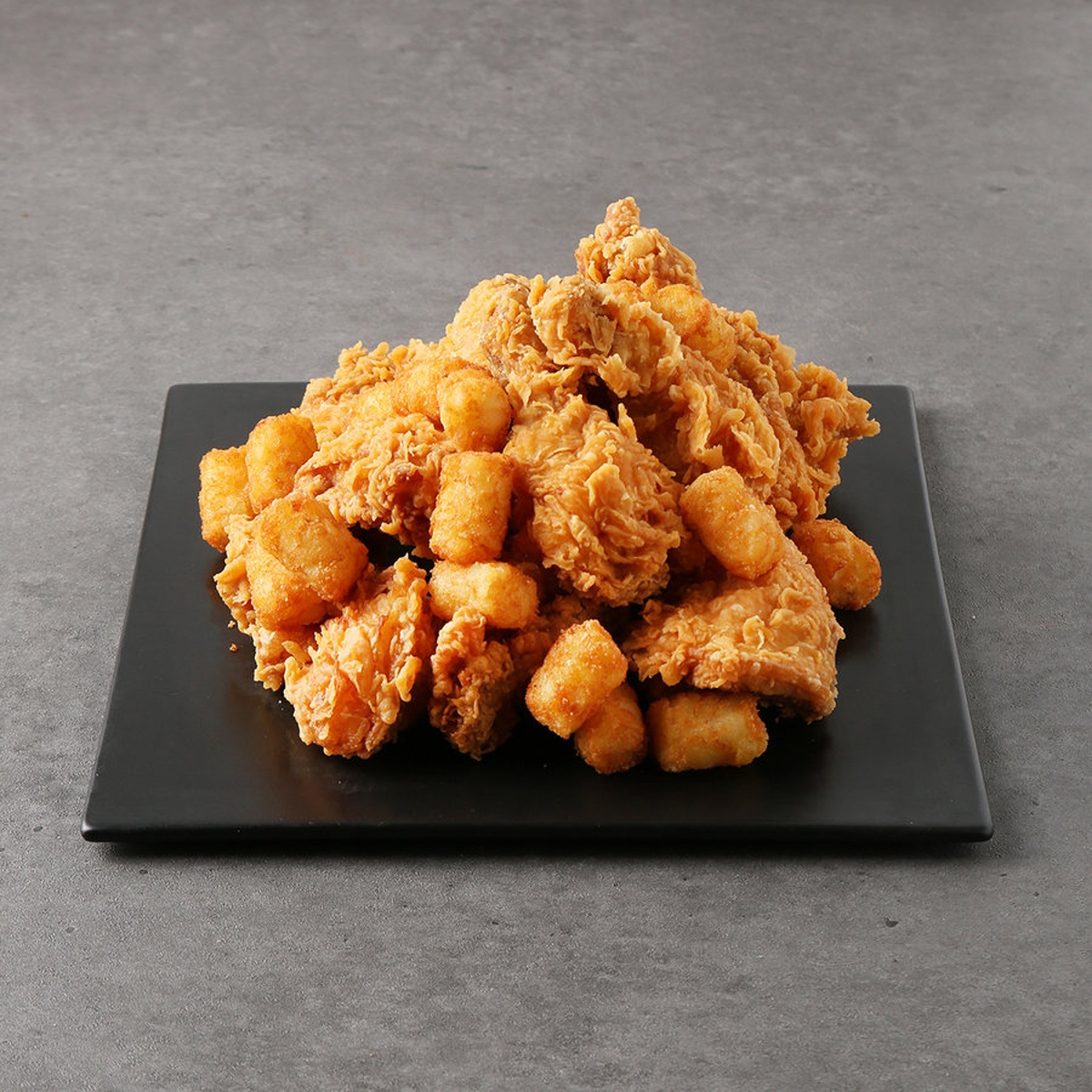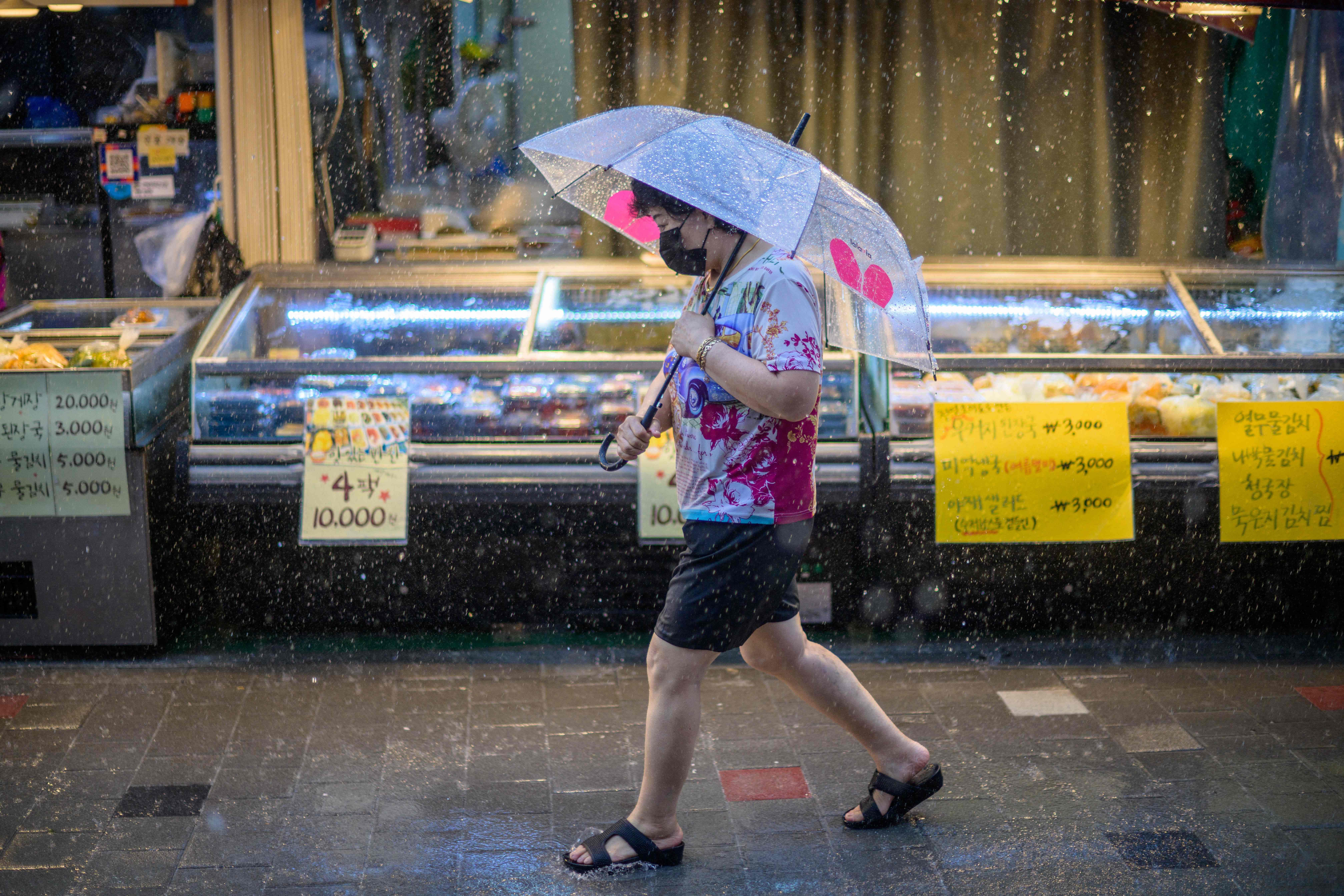Inflation triggers fried chicken price war in South Korea
Sign up now: Get insights on Asia's fast-moving developments

South Korean supermarket chain Homeplus launched "Dangdang" chicken in June.
PHOTO: HOMEPLUS
Follow topic:
SEOUL (BLOOMBERG) - In South Korea, where the highest inflation in years is causing chicken prices to rise, one grocery store is cutting costs.
Homeplus, the nation's second-largest retailer, has slashed prices for fried chicken by as much as two-thirds to cash in on consumer angst. Demand has surged. Koreans have left no stone unturned in looking for ways to save on food. That includes standing in hours-long queues to buy discounted poultry.
Inside one Homeplus store, a long line of customers waited patiently near the meats section on a recent day in hope of some cheap eats. An employee in a tall chef's hat emerged from the kitchen with key news: "We have 30 chickens coming!"
For shoppers at the front of the queue, the wait paid off. For those at the back, it was a waste of time. The experiment comes with risks.
Homeplus has turned the logic of seeking wider profit margins through price hikes on its head. But if successful, the retailer, which has nearly 140 branches, could boost its market share in a country where fried chicken is big business and emerge as an unlikely ally in the Bank of Korea's fight against inflation.
"I think there will be immense pressure on franchises to lower their prices or at least to stop raising them, given how cheap Homeplus is selling their fried chicken," said Lloyd Chan, an economist at Oxford Economics.
Whether prepared in pepper sauce or braised in soy, chicken plays a key role in South Korean cuisine. Poultry dishes are the number one choice on food delivery apps, beating out pizza, hamburgers and Chinese food.
The country is dotted with tens of thousands of chicken "hofs" - pubs that specialise in fried chicken and beer. But prices have soared recently, out-pacing most other foods.
Golden Olive Chicken, the marquee product at BBQ Chicken, one of the biggest brands in South Korea, now costs 24,000 won (S$25) - up from 16,000 won five years ago.
Higher delivery fees introduced during the pandemic have only added to consumer grumbles. So in late June, Homeplus launched "Dangdang" chicken, which in Korean means "fair" or "proud," but is also shorthand for "made today, for sale today."
Customers flooded the retailers' supermarkets to buy a bucket for 6,990 won. In the weeks that followed, rival chains followed suit.
For a limited time, Lotte slashed the price of its main chicken product by almost half. Emart, South Korea's largest retailer, rolled out its own week-long deal, selling a bucket of chicken for 5,980 won. The company said cooked chicken sales for July jumped 26% compared to last year.
Homeplus, which is run by Jay-hoon Lee, the former KFC Korea chief, has committed to selling discounted chicken indefinitely. The company says it has kept Dangdang profitable by streamlining its supply chain and relying on word of mouth - rather than a flashy marketing campaign - to draw in customers.
But keeping up with demand is still challenging: A typical store can only fry several dozen chickens a day. "We were able to lower the purchasing price through bulk buying," Homeplus said in a statement. "It's a product we launched as part of our 'inflation stabilisation project' underway since early this year to help out customers with lighter budget by offering volume sales at a low unit margin of profit."
Chicken plays a significant role in South Korea's inflation numbers. The meat is among the most heavily weighted among some 480 products and services that the government tracks for inflation, ranking 29th. And pork, which ranks 16th, the highest among grocers, also comes under pressure if chicken prices fall because the customer base is similar.

Whether Dangdang has more than a ripple-effect in the Bank of Korea's fight against inflation remains to be seen. Prices have surged this year after sharp jumps in energy and commodity costs. Demand has also quickly strengthened as Covid restrictions eased and people returned to in-restaurant dining.
To address inflation running at 6.3%, the fastest pace in more than 23 years, the BOK has raised interest rates repeatedly. Meanwhile the government has cut fuel taxes to keep a lid on costs while boosting supplies through extra imports and the release of public stockpiles.
South Korea raised the minimum wage by 5% for next year to help the low-paid cope with spiralling prices.
Dangdang has become a bit of a social media craze, with many South Koreans posting about their multi-day attempts to get the chicken and which sauces go best with supermarket-bought poultry.
One reseller even offered Dangdang for 10,000 won on an online secondhand goods store, according to Korean media reports.
And the taste? Park Da Young, 36, who posted on social media about her odyssey to get Dangdang, said it was just as tasty as dishes from nearby restaurants. "I reheated the chicken at home using an air fryer and didn't notice much difference," she said.
To be sure, a few discounted products at the local supermarket won't easily break up the grip chicken franchises have in almost every Korean neighbourhood.
The government estimates that shops specialising in chicken generate an average of 200 million won in sales each year. Total revenue nationwide amounts to a whopping 7.3 trillion won.
By comparison, Homeplus has sold about 460,000 buckets since its June launch. That equates to 3.2 billion won, a paltry figure next to the estimated 610 billion won sold each month by neighborhood stores nationwide.
Still, Koreans are hopeful that retailers like Homeplus will pressure others to lower prices. Many are far less sympathetic to mom-and-pop chicken stores than they were in 2010, when Lotte rolled out a similar low-priced product.
Public backlash was fierce and a then-presidential aide accused the supermarket chain of jeopardising tens of thousands of small businesses. Lotte stopped selling the chicken almost immediately.
For now, those are distant memories.
Kim Nayeon, who waited 40 minutes to get a bucket of Dangdang in the city of Incheon, said the quality was hard to beat. "It didn't taste quite as nice and salty as chicken from the franchises. But at such a price, I would buy it again," she said.
"Provided the line gets shorter."

